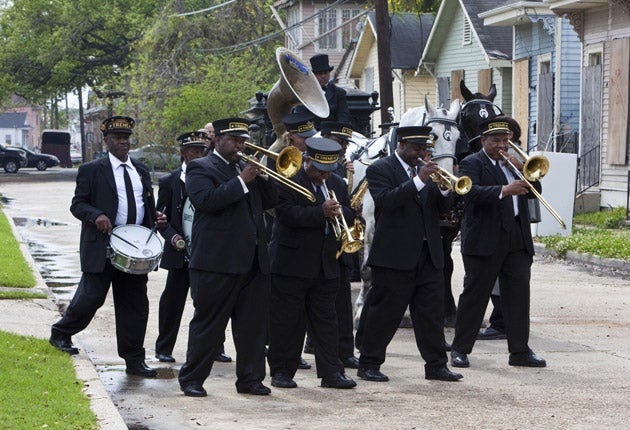Treme, Sky Atlantic, Friday<br/>The Model Agency, Channel 4, Wednesday
Musical ducking and diving in the heart of New Orleans should have been action-packed, but it takes a model agency to make things happen too fast

For those who enjoyed The Wire, David Simon's epic saga of crime and punishment, there was a familiar scene early in the first episode of his latest drama, Treme – a group of African-American men in a half-lit, derelict room conducting an illicit negotiation about the value of a highly prized local commodity that seemed to be in short supply.
In this case, the commodity was musicians rather than crack cocaine, and the deal concluded with a slap on the back rather than a bullet to the head. But, just as some viewers resorted to subtitles to help with the specialist terminology of Baltimore drug deals, the venerable musical traditions of New Orleans were wreathed in equally mysterious language: 'bones, second lines, or indeed the word "Treme" itself (it's a district of New Orleans and is pronounced Tr'may).
The chat among the musicians as they formed an impromptu parade – the first "second line" since the flood three months previously – wasn't a necessarily exclusive code as it was in The Wire; rather, it seemed an overture to the music of Treme, an irresistible melange of jazz, soul and funk that you assume is faithful to the neighbourhood.
As the parade ambled through the ruined streets, it gathered in storylines and characters: a wayward local musician (Wendell Pierce), his ex-wife and local bar owner (Khandi Alexander), the female chef-owner of an up-and-coming restaurant (Kim Dickens), and a DJ and self-appointed protector of the "real" city (Steve Zahn). What, exactly, the "real" New Orleans might be clearly preoccupies Simon: it's neither the tattered image of the all-welcoming Big Easy; nor is it the disaster zone abandoned to its fate first by the American government after the flood in 2005, and then by the media as their news agendas moved on.
So in these expansive opening episodes – the first the week before last, the second last Friday – a panorama rather than a drama was revealed to us. In the clunkiest scene, a grumpy academic (John Goodman) – a proxy for David Simon himself, presumably – literally got to grips with an arrogant British TV reporter so crudely drawn as to be beyond stereotype. Considerably better was the depiction of the search for one character's brother, who's either been washed away by the flood or the equally murky waters of the state judicial system.
If all this sounds a little dutiful, it was, and Sky Atlantic's ad breaks helped not one bit in developing momentum. But after The Wire, Simon might reasonably argue he's built up the requisite credit with audiences. In America, perhaps – but over here? We'll see. The performances and the music, equally good, helped, as did minor felicities such as offhand exchanges about how high the waters had risen in any given character's property, and the dawning sense that perhaps race rather than sandbags determined the extent of the collateral damage.
Still, it was with relief that after over two hours of drama, we saw the bar owner (Clarke Peters) beat a burglar, possibly to death. We had bobbed about aimlessly quite long enough.
No such dilly-dallying in the offices of the Premier model agency, the subject of a new, promising, fly-on-the-wall documentary series, The Model Agency. When India, a 16-year-old whom Premier had been grooming for four years, decided, on the eve of her debut at the New York shows, that catwalk modelling wasn't for her, the crux of the industry was laid bare. At times, the weepy brand of compassion espoused by Annie, the agency's head of new faces, for her young charge seemed genuine. But her wonky understanding of her pastoral duties ("You sometimes feel closer to them than their parents") was terribly compromised by the business of making money out of kids.
Thank goodness for India, apparently the only grown-up on screen: "I just wanted to go to the cinema and see my friends. I'm just 16 and I don't know what I want to do."
You can't help but hope that you never hear of her again.
Join our commenting forum
Join thought-provoking conversations, follow other Independent readers and see their replies
0Comments